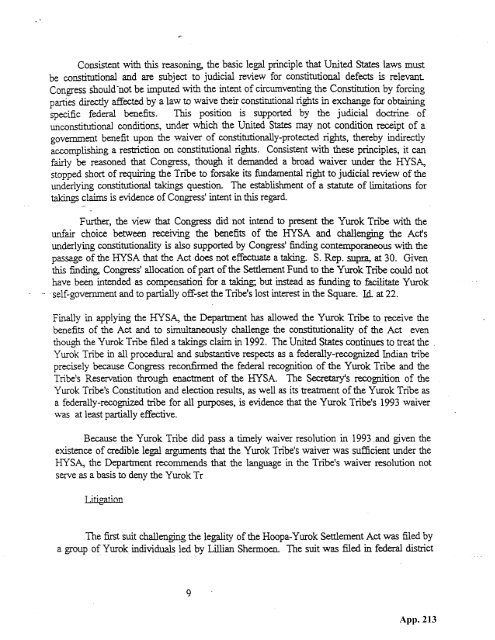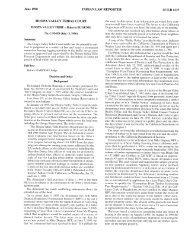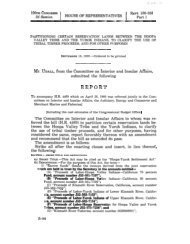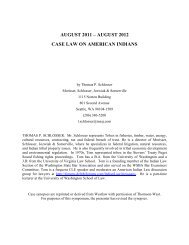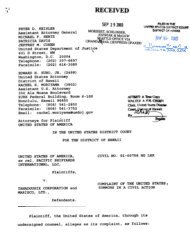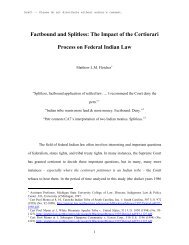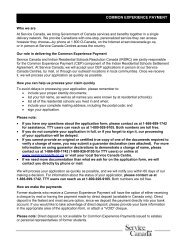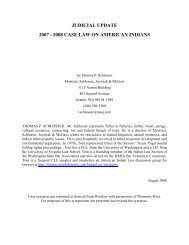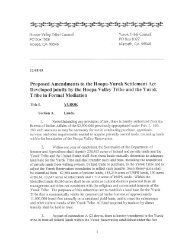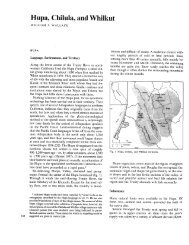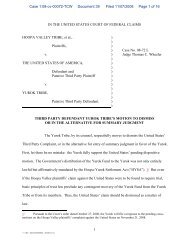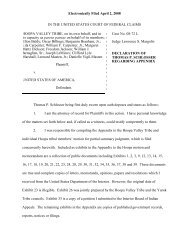Hoopa appendix supporting summary judgment - Schlosser Law Files
Hoopa appendix supporting summary judgment - Schlosser Law Files
Hoopa appendix supporting summary judgment - Schlosser Law Files
Create successful ePaper yourself
Turn your PDF publications into a flip-book with our unique Google optimized e-Paper software.
Consistent with this reasoning, the basic legal principle that United States laws must<br />
be constitutional and are subject to judicial review for constitutional defects is relevant<br />
Congress shouldnot be imputed with the intent of circumventing the Constitution by forcing<br />
parties directly affected by a law to waive their constitutional rights in exchange for obtaining<br />
specific federal benefits. This position is supported by the judicial doctrine of<br />
unconstitutional conditions, under which the United States may not condition receipt of a<br />
government benefit upon the waiver of constittthonally-protected rights, thereby indirectly<br />
accomplishing a restriction on constitutional rights. Consistent with these principles, it can<br />
fairly be reasoned that Con2ress, though it demanded a broad waiver under the HYSA,<br />
stopped short ofrequiring the Tribe to forsake its fundamental right to judicial review ofthe<br />
underlying constitutional takings question. The establishment of a statute of limitations for<br />
takings claims is evidence of Congress’ intent in this regard.<br />
Further, the view that Congress did not intend to present the Yurok Tribe with the<br />
unfair choice between receiving the benefits of the HYSA and challenging the Act’s<br />
underlying constitutionality is also supported by Congress’ finding contemporaneous with the<br />
passage ofthe HYSA that the Act does not effectuate a taking. S. Rep. supr~,at 30. Given<br />
this finding, Congress’ allocation ofpart ofthe Settlement Fund to the Yurok Tribe could not<br />
have been intended as compensation for a taking, but instead as funding to facilitate Yurok<br />
self-government and to partially off-set the Tribe’s lost interest in the Square. Id. at 22.<br />
Finally in applying the HYSA, the Department has allowed the Yurok Tribe to receive the<br />
benefits of the Act and to simultaneously challenge the constitutionality of the Act even<br />
thou~hthe Yurok Tribe filed a takings claim in 1992. The United States continues to treat the<br />
Yurok Tribe in all procedural and substantive respects as a federally-recognized Indian tribe<br />
precisely because Congress reconfirmed the federal recognition of the Yurok Tribe and the<br />
Tribe’s Reservation through enactment of the HYSA. The Secretary’s recognition of the<br />
Yurok Tribe’s Constitution and election results, as well as its treatment of the Yurok Tribe as<br />
a federally-recognized tribe for all purposes, is evidence that the Yurok Tribe’s 1993 waiver<br />
was at least partially effective.<br />
Because the Yurok Tribe did pass a timely waiver resolution in 1993 .and given the<br />
existence of credible legal arguments that the Yurok Tribe’s waiver was su~cientunder the<br />
HYSA, the Department recommends that the language in the Tribe’s waiver resolution not<br />
serve as a basis to deny the Yurok Tr<br />
I .itigati~n<br />
The first suit challenging the legality ofthe <strong>Hoopa</strong>-Yurok Settlement Act was filed by<br />
a group of Yurok individuals led by Lillian Shermoen. The suit was filed in federal disttict<br />
9


